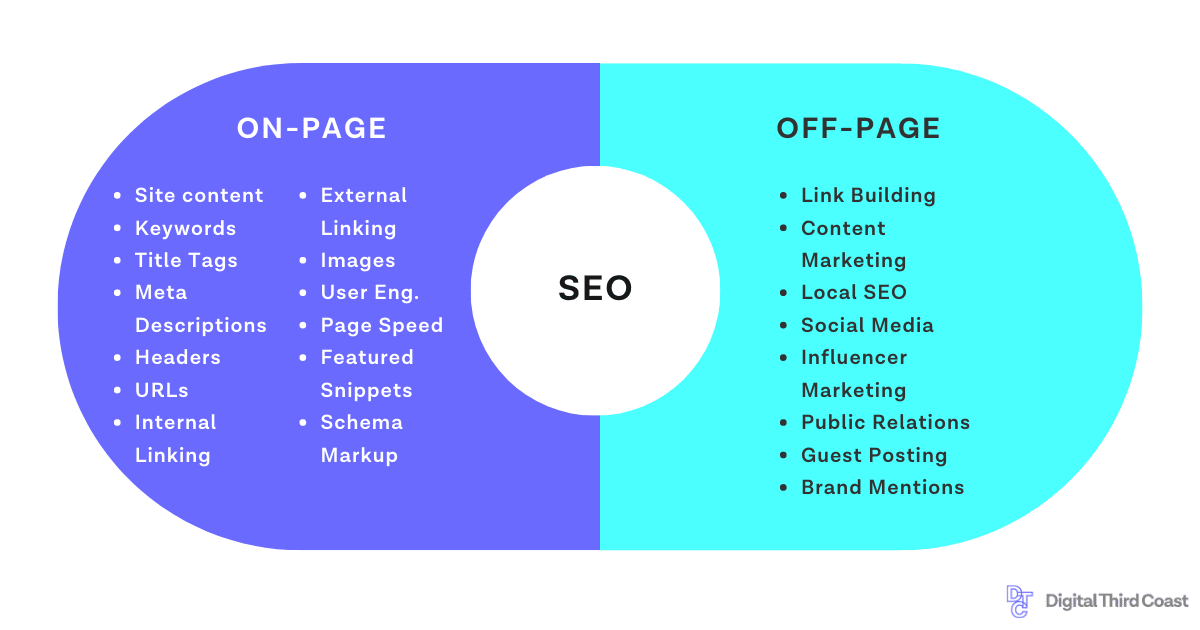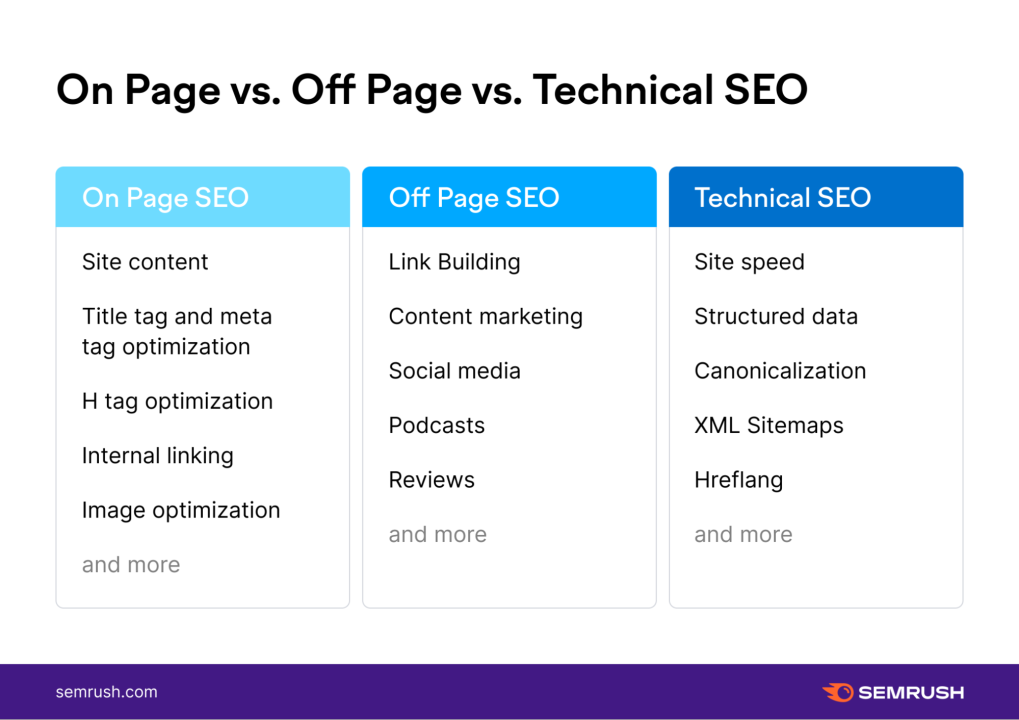On-Page SEO and Off-Page SEO are crucial for website success. Both play different roles in boosting your site’s visibility.
Understanding the differences between On-Page and Off-Page SEO is essential for effective digital marketing. On-Page SEO focuses on optimizing content within your website. This includes using keywords, enhancing meta descriptions, and improving site structure. Off-Page SEO, on the other hand, involves external efforts like backlinking and social media marketing.
Knowing how to balance these strategies can lead to better search engine rankings and increased traffic. In this blog, we’ll explore the unique aspects of each type of SEO and how they work together to improve your online presence.
On-page Seo Basics
Understanding the basics of on-page SEO is crucial for any website owner. On-page SEO involves optimizing individual web pages. This helps them rank higher on search engines. It also helps attract more relevant traffic. The focus is on both the content and HTML source code. Here, we will break down the key elements and content optimization of on-page SEO.
Key Elements
Several key elements contribute to effective on-page SEO. These include:
- Title Tags: They should be unique and include target keywords.
- Meta Descriptions: These provide a brief summary of the page content.
- Header Tags: Use H1, H2, H3 tags to organize content.
- URL Structure: Keep URLs short and keyword-rich.
- Alt Text for Images: Describe the image for search engines.
Content Optimization
Content is king in the SEO world. High-quality content attracts visitors and search engines. Here are some tips:
- Keyword Placement: Use keywords naturally throughout the content.
- Content-Length: Longer content often ranks better.
- Readability: Write in simple language. Use short sentences.
- Internal Links: Link to other relevant pages on your site.
- User Engagement: Add videos and images to keep visitors engaged.
Focusing on these elements will help improve your on-page SEO. This will lead to better rankings and more traffic.

Credit: www.digitalthirdcoast.com
On-page Seo Techniques
On-Page SEO is the foundation of any successful SEO strategy. It involves optimizing individual web pages to rank higher and earn more relevant traffic in search engines. These techniques ensure that your content is both user-friendly and search engine-friendly. Below, we will explore key On-Page SEO techniques, including Keyword Research and Meta Tags.
Keyword Research
Keyword research is the process of identifying the terms and phrases that users enter into search engines. These keywords guide your content creation. Proper keyword research helps you understand what your audience is looking for. Here are some steps to follow:
- Identify seed keywords related to your niche.
- Use tools like Google Keyword Planner or Ahrefs to find related keywords.
- Analyze the search volume and competition for each keyword.
- Choose long-tail keywords for more specific searches.
For example, if your website is about gardening, you might start with seed keywords like “gardening tips” and “plant care.” Then, you can find related long-tail keywords like “how to grow tomatoes” or “best indoor plants for beginners.”
Meta Tags
Meta tags provide information about your web page to search engines and visitors. They include the title tag, meta description, and other HTML elements. Effective meta tags can improve your click-through rates and search engine rankings. Here are some tips:
- Title Tag: Keep it under 60 characters. Include your primary keyword.
- Meta Description: Summarize your page content in 155 characters. Make it compelling.
- Header Tags: Use H1 for the main title and H2-H6 for subheadings.
For example, if your page is about growing tomatoes, your title tag could be “How to Grow Tomatoes: A Beginner’s Guide.” The meta description might read, “Learn how to grow tomatoes with our easy-to-follow guide. Tips for soil, watering, and more.”
Implementing these On-Page SEO techniques will help your web pages rank better and attract more visitors. Focus on keyword research to understand your audience’s needs, and use meta tags to provide clear information to search engines and users.
Off-page Seo Basics
Off-Page SEO is crucial for improving your website’s ranking. It involves activities outside your website that impact your search engine rankings. These activities help build your site’s reputation and authority.
Key Elements
Several key elements contribute to Off-Page SEO. One important element is backlinks. Quality backlinks from reputable sites signal trust to search engines. Social signals also play a role. Likes, shares, and comments on social media increase your site’s visibility.
Another element is brand mentions. Even without a link, mentions of your brand can boost your site’s authority. Guest blogging is also effective. Writing articles for other sites helps you reach a new audience and gain backlinks.
Building Authority
Building authority is essential for Off-Page SEO. Authority shows search engines that your site is reliable. One way to build authority is through content marketing. High-quality content attracts backlinks and social shares.
Influencer outreach can also build authority. Connect with influencers in your niche. Their endorsement can enhance your site’s reputation. Participating in forums and online communities helps too. Sharing your expertise on platforms like Quora or Reddit can build trust.
Remember, building authority takes time. Consistency and quality are key. Focus on creating valuable content and engaging with your audience. Over time, your site’s authority will grow, leading to higher search engine rankings.
Off-page Seo Techniques
Off-Page SEO techniques are essential for improving your website’s authority and ranking. These methods help search engines understand your site’s reputation. They also show how other websites view your content. Let’s explore some effective Off-Page SEO techniques.
Backlinks
Backlinks are links from other websites to your site. They act like votes of confidence. High-quality backlinks signal to search engines that your content is valuable. Focus on earning backlinks from reputable sites. Guest posting on popular blogs is one way to gain backlinks. Collaborating with influencers can also help. Always aim for natural, relevant backlinks.
Social Media
Social media platforms can boost your Off-Page SEO. Sharing your content on social media increases its visibility. It encourages others to share and link to your content. Engage with your audience by responding to comments. Participate in relevant groups and discussions. This builds relationships and trust. A strong social media presence can lead to more backlinks and traffic.
Comparing On-page And Off-page Seo
Understanding the differences and similarities between On-Page and Off-Page SEO is crucial. Both are important for a successful SEO strategy. They work together to improve search engine rankings. Let’s explore the key aspects of each.
Similarities
Both On-Page and Off-Page SEO aim to improve website visibility. They help search engines understand your site better. Also, both require ongoing efforts. Consistency is key for effective SEO. Additionally, both types focus on relevant keywords. These keywords help attract the right audience. Finally, both need quality content to be effective. Content is central to any SEO strategy.
Differences
On-Page SEO deals with elements on your website. This includes title tags and meta descriptions. Content quality and keyword usage are vital. Internal links also play a role. These are aspects you can control directly.
Off-Page SEO focuses on external factors. Backlinks from other sites are crucial. These links signal trust and authority to search engines. Social signals and online reviews are part of Off-Page SEO. These elements are harder to control. But they are equally important.
In summary, On-Page SEO is about optimizing your site. Off-Page SEO is about building authority and trust outside your site. Both are essential for a balanced SEO strategy.

Credit: www.linkedin.com
Integrating On-page And Off-page Seo
Integrating On-Page and Off-Page SEO is vital for a successful SEO strategy. These two aspects work together to improve your site’s visibility. On-Page SEO focuses on optimizing the content and structure of your website. Off-Page SEO involves activities outside your site that help enhance its authority. Combining both ensures a balanced approach to improving your search engine rankings.
Creating A Balanced Strategy
Start by ensuring your website is user-friendly. Optimize page titles, meta descriptions, and headers. Use relevant keywords naturally within your content. Ensure your website loads quickly and is mobile-friendly. These are essential On-Page SEO practices.
Next, focus on Off-Page SEO. Build high-quality backlinks from reputable sites. Engage with your audience on social media. Participate in online communities related to your niche. These efforts help increase your site’s authority and trustworthiness.
Combining these efforts creates a balanced strategy. Both On-Page and Off-Page SEO are important. They complement each other and drive better results. A balanced approach ensures long-term success in search engine rankings.
Monitoring And Adjusting
Regularly monitor your SEO performance. Use tools like Google Analytics and Search Console. Track changes in your website’s traffic and rankings. Look for patterns or drops that need attention.
Adjust your strategy based on the data. Improve underperforming pages. Update old content with new information. Adjust keyword usage if necessary. Regular monitoring ensures your SEO efforts stay effective.
Stay updated with SEO trends and algorithm changes. Search engines constantly evolve. Adapting to these changes keeps your strategy relevant. Monitoring and adjusting is crucial for maintaining your site’s visibility.

Credit: www.woorank.com
Frequently Asked Questions
What Is On-page Seo?
On-Page SEO involves optimizing individual web pages. It focuses on content, HTML source code, and user experience. This includes optimizing titles, meta descriptions, headers, and images. Effective On-Page SEO improves search engine rankings and user engagement.
What Is Off-page Seo?
Off-Page SEO refers to activities outside your website. It involves building backlinks, social media marketing, and influencer outreach. This helps improve your site’s authority and search engine rankings. Off-Page SEO boosts visibility and credibility online.
Why Is On-page Seo Important?
On-Page SEO ensures your content is relevant and easily accessible. It improves user experience and search engine rankings. Proper On-Page SEO attracts organic traffic and enhances site usability. It is crucial for achieving higher search engine visibility.
Why Is Off-page Seo Important?
Off-Page SEO enhances your website’s authority and trustworthiness. Quality backlinks signal to search engines that your site is valuable. This can improve your search engine rankings significantly. Off-Page SEO also drives referral traffic and increases brand awareness.
Conclusion
Balancing on-page and off-page SEO is crucial for your website’s success. Both strategies work together to improve your rankings. On-page SEO focuses on content and structure. Off-page SEO builds authority through backlinks and social signals. Implementing both ensures a well-rounded approach.
Regular updates and monitoring are essential. Stay informed about SEO trends and adjust tactics as needed. Your efforts will pay off with increased visibility and traffic. Keep learning and refining your strategies. This way, your website will thrive in the competitive digital landscape.